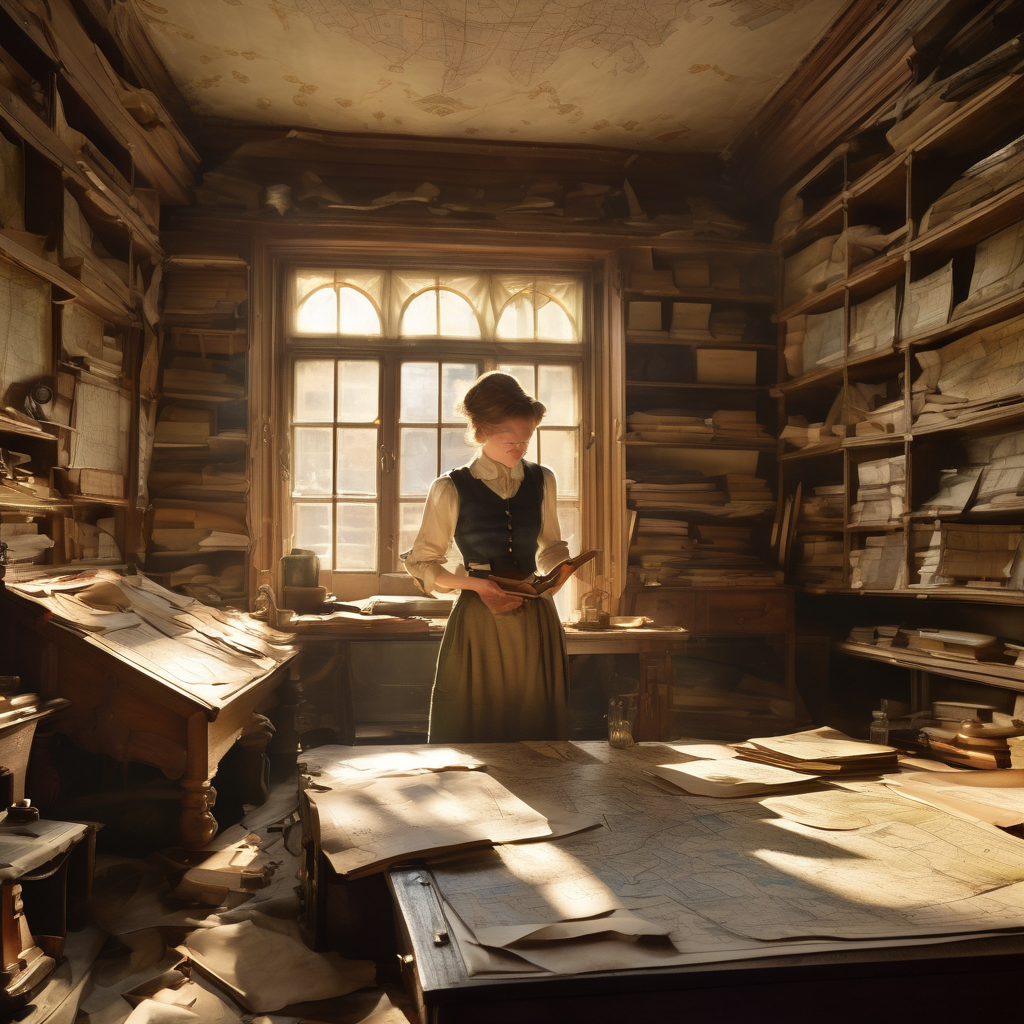Margot inherited her grandmother’s cartography shop on the same day the city announced they were demolishing the entire district for sustainable housing. The irony wasn’t lost on her—maps of places that would soon cease to exist, housed in a building about to become memory.
She found the journal wedged behind a false panel in the desk drawer, its leather binding soft as breath. The first entry was dated 1892, though her grandmother had only been born in 1945. The handwriting shifted every few pages, like a conversation across centuries.
“The roads remember what we choose to forget,” one entry read. “They curl beneath the visible world like sleeping cats, waiting.”
Margot traced her finger along a map labeled “Routes of the Unclaimed.” The streets didn’t match anything in the city records. When she held it up to the window, the afternoon light revealed hidden marks—tiny symbols that seemed to pulse with their own quiet life.
That night, she dreamed of walking down an avenue lined with trees that bore fruit of pure sound. She woke with the taste of violin music on her tongue.
The developer arrived the next morning, all mindful productivity and calculated empathy. “We’re creating spaces for climate resilience,” he said, spreading his tablet across her counter. “Your grandfather’s work could be digitized, preserved in the cloud.”
“Grandmother,” Margot corrected, but he was already scrolling through demolition schedules.
After he left, she unrolled a map titled “The Meridians of Lost Conversations.” Her finger found a street marked with a small asterisk. The annotation read: “Here, the words you never said to your mother still wait in the rain gutters.”
Margot locked the shop and walked to where the map indicated. The street existed, though no modern map acknowledged it—a narrow alley between two office buildings where the air tasted older, seasoned with decades of secrets.
She found them there, the words, scattered like leaves. They weren’t visible exactly, but she could feel them catching at her ankles. “I forgive you,” and “Please don’t go,” and “I never learned how to braid my hair the way you did.”
Back at the shop, she discovered more maps. One showed the migration patterns of discarded love letters. Another traced the underground rivers where divorced couples’ wedding rings collected in small, bright pools. A third revealed the places where children’s imaginary friends went to retire.
The demolition crew was scheduled for Monday. Margot worked through the weekend, following each map’s guidance. On the Street of Unfinished Arguments, she found two old men who’d been circling the same debate about baseball statistics since 1987, unable to leave until someone declared them both right. She did, and watched them dissolve into afternoon light, finally free.
She discovered the Repository of Misdelivered Messages, where birthday cards and love notes that never reached their destinations had formed their own small civilization. She helped them find their intended recipients, even the ones who’d been dead for decades—their ghosts were grateful for the closure.
On Sunday night, she unrolled the final map, the one at the very bottom of the stack. It showed only one road, unlabeled, running from her shop to somewhere beyond the edges of the paper.
She understood then what her grandmother—and all the grandmothers before her—had been doing. They weren’t just making maps. They were tending to the forgotten infrastructure of human connection, the invisible thoroughfares where lost things traveled, hoping to be found.
The developer had talked about resilience, about building for the future. But what about the past that still needed tending? What about the roads that existed outside of city planning and zoning ordinances?
Margot rolled up every map and packed them carefully. When the demolition crew arrived Monday morning, they found only an empty shop and a note: “Gone to chart new territories of the misplaced.”
She walks those hidden roads now, adding to the maps. In a world obsessed with moving forward, with transformation and progress, she documents the places where time moves differently. The corners where retired dreams gather to play chess. The intersections where forgotten names pool like standing water. The boulevards where the echoes of extinct languages still conduct their daily business.
Sometimes, on foggy mornings, people swear they see her—a woman with ink-stained fingers and maps tucked under her arm, walking down streets that shouldn’t exist, maintaining the roads that GPS will never find, the ones that lead not to destinations but to all the things we’ve lost along the way.
She’s become what the journal promised she would: the last mapmaker of forgotten roads, charting the geography of everything we’re too busy to remember, ensuring that even in a world of constant transformation, the lost things still have a way home.

Leave a Reply